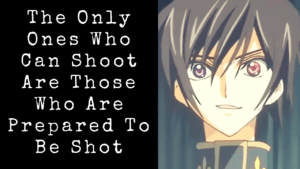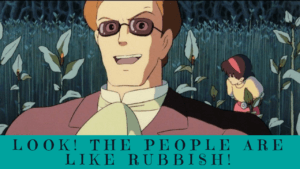Let’s learn Japanese with Keishin Ukai’s quote from Haikyu!!
CONTENTS
Video
Keishin Ukai’s Quote
Japanese: 下を向くんじゃねぇ!バレーは常に上を向くスポーツだ!
Romaji: shita o muku n janē! barē wa tsuneni ue o muku supōtsu da!
English: Don’t you dare look down! Volleyball is a sport where you’re always looking up!
Analysis
下を向くんじゃねぇ
下 (noun) means “below”, “down” or “under”.
Noun を向く means “to face or turn towards something”.
So 下を向く means “to look down”.
んじゃねぇ is the negative imperative (don’t!), used with a verb dictionary form.
It’s the broken version of んじゃない which is commonly used in conversation. And it’s also the broken version of のではない which is rarely used as it sounds too stiff. んじゃねぇ sounds very rough and aggressive so It’s normally used in casual male speech.
So 下を向くんじゃねぇ means “don’t you dare look down”.
バレーは常に上を向くスポーツだ
Main Clause: バレーはスポーツだ
バレー means “volleyball”.
Please note that “ballet” is also called バレエ in Japanese. When we write it, we use the katakana エ for ballet instead of the prolonged sound mark (ー) in order to distinguish between them. But the pronunciation is the same so you usually need context in speech. If you want to make sure, you can say バレーボール for volleyball and バレエダンス (ballet dance) for ballet.
は is the particle indicating the topic of the sentence.
スポーツ means “sport”.
だ is used to make the statement affirmative and declarative.
So バレーはスポーツだ means “volleyball is a sport”.
Subordinate Clause: 常に上を向く
常に means “always”.
上 means “above”, “up” or “upon” so 上を向く means “to look up”.
The subordinate clause is inserted before the noun to add more information. So バレーは常に上を向くスポーツだ means “Volleyball is a sport where you’re always looking up!”
So when you want to modify a noun with a clause in Japanese, you don’t need a relative pronoun such as “where”, “which” or “that”. Instead, you put the subordinate clause before the noun that you want to modify.
Examples
〜を向く (to face/turn towards something)
いつも横を向いて寝ます。
itsumo yoko o muite nemasu.
I always sleep on my side.
ひまわりは常に太陽の方を向く。
himawari wa tsuneni taiyō no hō o muku.
Sunflowers always face the Sun.
前を向いて歩かないと、人にぶつかるよ。
mae o muite arukanai to, hito ni butsukaru yo.
You have to walk facing forward, or you will bump into someone.
Verb Dictionary-Form + んじゃない (Negative Imperative)
嘘をつくんじゃない!
uso o tsuku njanai!
Don’t lie!
ふざけるんじゃない!
fuzakeru njanai!
Stop fooling around!
いきなり叫ぶんじゃねぇよ。
ikinari sakebu njanē yo.
Don’t shout all of a sudden.
- It’s usually used between ones who are very close to each other or from superiors to inferiors in status such as parents to children or teachers to students.
- んじゃありません is the polite negative imperative.
- When the verb ends in る, the る is often removed in very rough speech.
馬鹿にす(
る)んじゃねぇ。baka ni su n janē.
Don’t you dare mock me.
- “Verb Te-Form + いる” (progressive tense) is also used when the speaker wants to stop the listener’s continuing action. This る is often removed as well.
笑って(
る)んじゃねぇよ!waratte n janē yo!
Stop laughing!
Support Easy Peasy Japanesey
If you enjoy our content, please consider supporting Easy Peasy Japanesey. Your support will help keep us going. Thanks for all your support!


